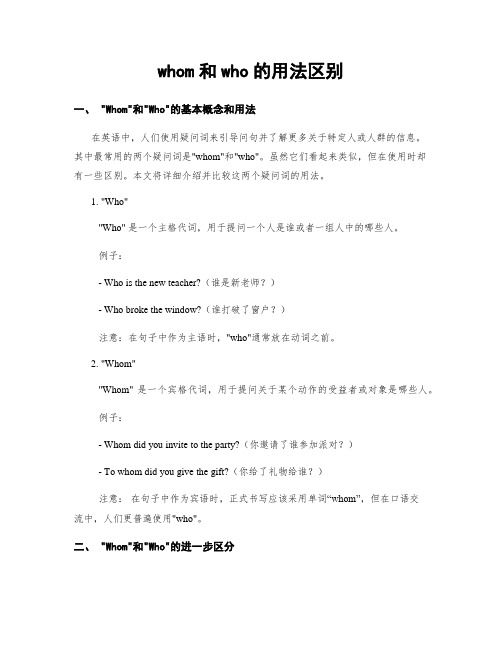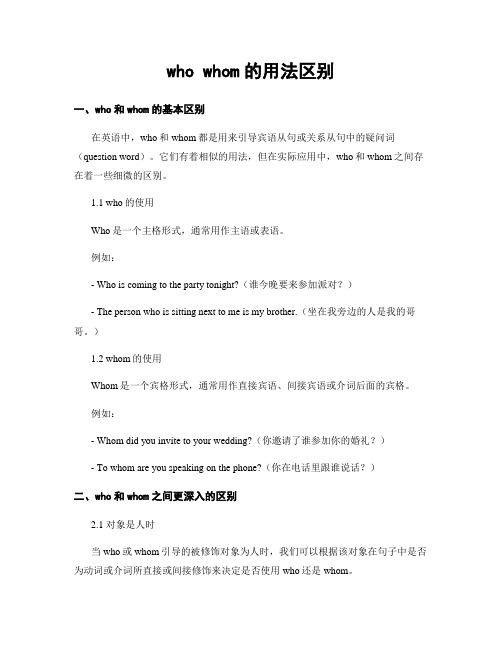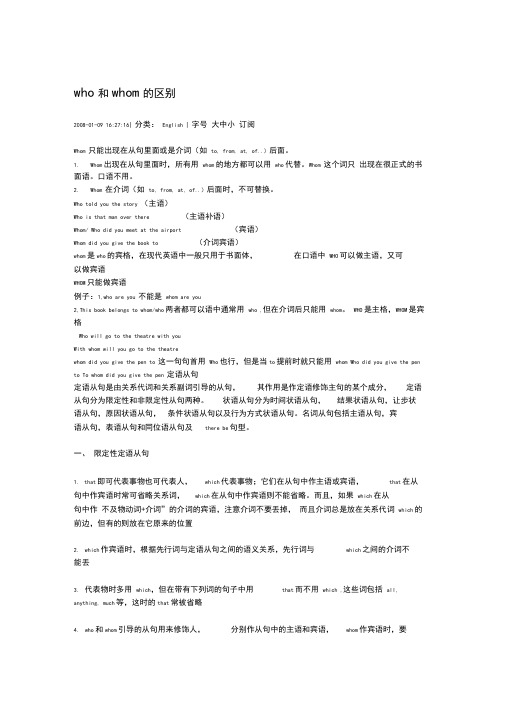who和whom的区别
whom和who的用法区别

whom和who的用法区别一、 "Whom"和"Who"的基本概念和用法在英语中,人们使用疑问词来引导问句并了解更多关于特定人或人群的信息。
其中最常用的两个疑问词是"whom"和"who"。
虽然它们看起来类似,但在使用时却有一些区别。
本文将详细介绍并比较这两个疑问词的用法。
1. "Who""Who" 是一个主格代词,用于提问一个人是谁或者一组人中的哪些人。
例子:- Who is the new teacher?(谁是新老师?)- Who broke the window?(谁打破了窗户?)注意:在句子中作为主语时,"who"通常放在动词之前。
2. "Whom""Whom" 是一个宾格代词,用于提问关于某个动作的受益者或对象是哪些人。
例子:- Whom did you invite to the party?(你邀请了谁参加派对?)- To whom did you give the gift?(你给了礼物给谁?)注意:在句子中作为宾语时,正式书写应该采用单词“whom”,但在口语交流中,人们更普遍使用"who"。
二、 "Whom"和"Who"的进一步区分虽然主要区别在于一个是主格代词,而另一个是宾格代词,但具体考虑到两个疑问词作用于句子中时所提供的信息,我们可以进一步了解它们之间的不同。
1. 提问对象"Who"通常用来询问某人(或一组人)的身份、职业、特征等。
例如,“Who is at the door?”(门口是谁?),这个问题目标在于了解是谁站在门口。
"Whom"则通常用来询问某个动作施加给了哪些人或对象。
例如,“Whom did he give the flowers to?”(他把花给了谁?),这个问题想知道他将花送给了谁。
who和whom和whose的用法区别

who和whom和whose的用法区别who先行词指人,在定语从句中充当主语,有时也可做宾语。
whom先行词指人,在定语从句中充当宾语。
whose先行词指人或物,在定语从句中充当定语。
扩展资料关系代词who,whom的用法:who和whom均只用于指人,不用于指事或物,其中who在定语从句中用作主语,whom在定语从句中用作宾语。
如:I met a girl who knew your sister.我碰到一个认识你姐姐的姑娘。
In Berlin,he first met the woman whom he would one day marry.在柏林,他第一次遇见那个女人,后来他终于跟她结了婚。
She introduced me to her husband,whom I hadn’t met before.她把我介绍给她丈夫,我以前没见过他。
但是,用作宾语的whom如果不是紧跟在介词之后,通常会被省略或用who,that代之.如:The person to whom I complained is the manager.我向他投诉的那个人是经理。
The person (who,whom,that) I complained to is the manager.我向他投诉的.那个人是经理。
关系代词whose的用法:关系代词whose既可用于指人,也可用于指事或物,它在定语从句中主要用作定语.如:She is the woman whose car was stolen.她就是汽车被盗的那个女人。
This is the house whose windows were broken.这就是窗户被打破了的房子。
Mrs.Gray,whose children are in college,is trying to get a job.格雷太太的孩子们都在上大学,她想找一份工作。
His house,whose windows were all broken,was adepressing sight.他的房子窗户无一完好,一派令人心酸的景象。
who whom的用法区别

who whom的用法区别一、who和whom的基本区别在英语中,who和whom都是用来引导宾语从句或关系从句中的疑问词(question word)。
它们有着相似的用法,但在实际应用中,who和whom之间存在着一些细微的区别。
1.1 who的使用Who是一个主格形式,通常用作主语或表语。
例如:- Who is coming to the party tonight?(谁今晚要来参加派对?)- The person who is sitting next to me is my brother.(坐在我旁边的人是我的哥哥。
)1.2 whom的使用Whom是一个宾格形式,通常用作直接宾语、间接宾语或介词后面的宾格。
例如:- Whom did you invite to your wedding?(你邀请了谁参加你的婚礼?)- To whom are you speaking on the phone?(你在电话里跟谁说话?)二、who和whom之间更深入的区别2.1 对象是人时当who或whom引导的被修饰对象为人时,我们可以根据该对象在句子中是否为动词或介词所直接或间接修饰来决定是否使用who还是whom。
a) 当被修饰对象是动词所直接修饰时,我们使用who。
例如:- He is the person who fixed my computer.(他就是修好我电脑的那个人。
)b) 当被修饰对象是动词所间接修饰时,我们使用whom。
例如:- I met a girl whom I used to study with.(我遇到了一个与我曾一起学习的女孩。
)c) 当be动词或谓语动词中的介词后面跟着被修饰对象时,我们使用whom。
例如:- The man to whom she gave the book is her teacher.(她给书的那个人是她的老师。
)2.2 对象不是人时当who或whom引导的被修饰对象不是人,而是非人称代词(如which、that)时,我们只使用who来引导宾语从句或关系从句。
who和whom的用法区别

who和whom的用法区别一、引言在英语语法中,who和whom都是用于替代人称的关系代词。
然而,很多人对这两个词的用法存在困惑,并经常混淆它们的正确使用方式。
本文将详细解释who 和whom的区别及正确用法。
二、什么是who?Who是一个主格疑问代词和关系代词,在句子中用来引导主动句或作为动词的主语。
它可以替代主语或表语,并且只能出现在从句的主干中。
例句1: Who is the woman in the red dress?(红裙子里面那个女人是谁?)例句2: The girl who is singing on stage is my sister.(在台上唱歌的女孩是我妹妹。
)三、什么是whom?Whom是一个宾格疑问代词和关系代词,在句子中通常作为宾语出现。
它可以替代直接宾语或间接宾语,并且只能出现在从句中。
例句3: Whom did you invite to the party?(你邀请了谁参加派对?)例句4: The person whom I met at the conference was very knowledgeable.(我在会议上遇到的人非常有见地。
)四、who与whom的区别1. 主动与被动角色:Who用于主动语态,而whom用于被动语态。
例子:Who wrote this book?(谁写了这本书?)By whom was this book written?(这本书是由谁写的?)2. 主语和宾语角色:Who在句子中作为主语使用,而whom则作为宾语使用。
例子:Who is that girl over there?(那边那个女孩是谁?)Whom did you visit yesterday?(昨天你拜访了谁?)五、如何确定使用who还是whom?虽然who和whom有一些明确的规则,但实际使用时仍然存在困惑。
以下是一些方法来帮助您确定正确使用who还是whom。
定语从句中who 和whom 的区别

定语从句中who 和whom 的区别一、介绍定语从句定语从句是在复合句中作定语的从句,它用来修饰某个名词或代词,起到进一步限定或说明的作用。
在定语从句中,who 和whom 都是关系代词,用来引导人的定语从句,但它们在使用时有一些区别。
二、who 和 whom 的区别1. 定义- who:是主格形式的关系代词,用于引导定语从句,指代主语。
- whom:是宾格形式的关系代词,用于引导定语从句,指代宾语。
2. 位置- who:通常位于定语从句的主语位置。
- whom:通常位于定语从句的宾语位置。
3. 功能- who:在定语从句中作主语,与先行词在人称、数一致。
- whom:在定语从句中作宾语,与先行词在人称、数一致。
4. 引导方式- who:用于引导非限制性定语从句或限制性定语从句中的主语。
- whom:用于引导限制性定语从句中的宾语。
5. 用法(1) who 的用法:- 当先行词是人时,且在定语从句中作主语时,用 who 引导。
例如:The man who is sitting over there is my father.(那个坐在那里的人是我的父亲。
)- 当先行词是人时,且在定语从句中作非限制性定语从句的主语时,用 who 引导。
例如:My sister, who is a doctor, lives in London.(我的姐姐是一名医生,她住在伦敦。
)- 当先行词是人时,且在定语从句中作非限制性定语从句的宾语时,用 whom 引导。
例如:I met my friend, whom I hadn't seen for years.(我见到了多年未见的朋友。
)(2) whom 的用法:- 当先行词是人时,且在定语从句中作宾语时,用 whom 引导。
例如:The man whom I met yesterday is a famous actor.(我昨天遇到的那个人是一位著名的演员。
关系代词who与whom的区别

关系代词who与whom的区别(最新版)编制人:__________________审核人:__________________审批人:__________________编制单位:__________________编制时间:____年____月____日序言下载提示:该文档是本店铺精心编制而成的,希望大家下载后,能够帮助大家解决实际问题。
文档下载后可定制修改,请根据实际需要进行调整和使用,谢谢!并且,本店铺为大家提供各种类型的经典范文,如词性大全、句法大全、句型大全、从句大全、时态大全、语态大全、语法大全、虚拟语气、用法辨析、其他资料等等,想了解不同范文格式和写法,敬请关注!Download tips: This document is carefully compiled by this editor.I hope that after you download it, it can help you solve practical problems. The document can be customized and modified after downloading, please adjust and use it according to actual needs, thank you!In addition, this shop provides you with various types of classic sample essays, such as part of speech, syntax, sentence pattern, clause, tense, voice, grammar, subjunctive, usage analysis, other materials, etc. If you want to know the different formats and writing methods of the model essay, please pay attention!关系代词who与whom的区别两者均只用于人,从理论上说,who 为主格,whom为宾格,但实际上,除非在正式文体中,宾格关系代词 whom 往往省略不用,或用who或that代之。
who和whom的区别

who和whom的区别2008-01-09 16:27:16| 分类:English | 字号大中小订阅Whom 只能出现在从句里面或是介词(如to, from, at, of..)后面。
1.Whom出现在从句里面时,所有用whom的地方都可以用who代替。
Whom 这个词只出现在很正式的书面语。
口语不用。
2.Whom 在介词(如to, from, at, of..)后面时,不可替换。
Who told you the story (主语)Who is that man over there (主语补语)Whom/ Who did you meet at the airport (宾语)Whom did you give the book to (介词宾语)whom是who的宾格,在现代英语中一般只用于书面体,在口语中WHO可以做主语,又可以做宾语WHOM只能做宾语例子:1,who are you 不能是whom are you2,This book belongs to whom/who两者都可以语中通常用who ,但在介词后只能用whom。
WHO是主格,WHOM是宾格Who will go to the theatre with youWith whom will you go to the theatrewhom did you give the pen to 这一句句首用Who也行,但是当to提前时就只能用whom Who did you give the pen to To whom did you give the pen 定语从句定语从句是由关系代词和关系副词引导的从句,其作用是作定语修饰主句的某个成分,定语从句分为限定性和非限定性从句两种。
状语从句分为时间状语从句,结果状语从句,让步状语从句,原因状语从句,条件状语从句以及行为方式状语从句。
名词从句包括主语从句,宾语从句,表语从句和同位语从句及there be句型。
who和whom在定语从句中做宾语

who和whom在定语从句中做宾语在英语语法中,who 和 whom 是两个常见的代词,用于引导定语从句。
它们用来引述人或具有人称性质的事物。
在定语从句中,who 用作主语或表语,而 whom 用作宾语。
本文将详细讨论这两个代词在定语从句中作为宾语的应用。
一、who 和 whom 的区别1. 定义:- Who:用作主语或表语时,引用一个人或人称性质的事物。
- Whom:用作宾语时,引用一个人或人称性质的事物。
2. 用法:- Who:作为主语或表语,用于句子的主语位置或连系动词后的表语位置。
例句:- The person who is sitting next to me is my sister.(作主语)- He is the one who won the award.(作表语)- Whom:作为宾语,通常出现在动词或介词后面。
例句:- The girl whom I met yesterday is a famous actress.(作宾语)- To whom did you give the book?(作宾语)二、who 和 whom 在定语从句中做宾语的用法在定语从句中,当 who 或 whom 引用人时作为宾语,根据关系代词与宾语关系的不同,需要注意以下几点:1. 当 who 或 whom 引用人称代词作宾语时,需要根据其在从句中的功能来决定是否用 whom。
例句:- The lady, whom I asked for directions, was very friendly.(whom 引用人且作为介词后的宾语)- The man who(m) I saw is my neighbor.(who 作为动词后的宾语)2. 当 who 或 whom 引用非人称代词作宾语时,只能使用 whom。
例句:- The cat whom I adopted is very cute.(whom 引用非人称代词作宾语)3. 当 who 或 whom 引用宾语从句中的主语时,可以使用 who 或whom。
- 1、下载文档前请自行甄别文档内容的完整性,平台不提供额外的编辑、内容补充、找答案等附加服务。
- 2、"仅部分预览"的文档,不可在线预览部分如存在完整性等问题,可反馈申请退款(可完整预览的文档不适用该条件!)。
- 3、如文档侵犯您的权益,请联系客服反馈,我们会尽快为您处理(人工客服工作时间:9:00-18:30)。
who和whom的区别2008-01-09 16:27:16| 分类:English|字号大中小订阅Whom 只能出现在从句里面或是介词(如to, from, at, of..)后面。
1.Whom 出现在从句里面时,所有用whom的地方都可以用who代替。
Whom 这个词只出现在很正式的书面语。
口语不用。
2.Whom 在介词(如to, from, at, of..)后面时,不可替换。
Who told you the story? (主语)Who is that man over there? (主语补语)Whom/ Who did you meet at the airport? (宾语)Whom did you give the book to? (介词宾语)whom是who的宾格,在现代英语中一般只用于书面体,在口语中WHO 可以做主语,又可以做宾语WHOM只能做宾语例子:1,who are you? 不能是whom are you?2,This book belongs to whom/who?两者都可以语中通常用who,但在介词后只能用whom。
WHO 是主格,WHOM是宾格e.g Who will go to the theatre with you?With whom will you go to the theatre?whom did you give the pen to?这一句句首用Who 也行,但是当to提前时就只能用whom Who did you give the pen to? To whom did you give the pen?定语从句定语从句是由关系代词和关系副词引导的从句,其作用是作定语修饰主句的某个成分,定语从句分为限定性和非限定性从句两种。
状语从句分为时间状语从句,结果状语从句,让步状语从句,原因状语从句,条件状语从句以及行为方式状语从句。
名词从句包括主语从句,宾语从句,表语从句和同位语从句及there be句型。
一、限定性定语从句1. that即可代表事物也可代表人,which代表事物;它们在从句中作主语或宾语,that在从句中作宾语时常可省略关系词,which在从句中作宾语则不能省略。
而且,如果which在从句中作“不及物动词+介词”的介词的宾语,注意介词不要丢掉,而且介词总是放在关系代词which的前边,但有的则放在它原来的位置2. which作宾语时,根据先行词与定语从句之间的语义关系,先行词与which之间的介词不能丢3. 代表物时多用which,但在带有下列词的句子中用that而不用which,这些词包括all, anything, much等,这时的that常被省略4. who和whom引导的从句用来修饰人,分别作从句中的主语和宾语,whom作宾语时,要注意它可以作动词的宾语也可以作介词的宾语5. where是关系副词,用来表示地点的定语从句6. when引导定语从句表示时间〔注〕值得一提的是,表示时间“time"一词的定语从句只用when引导,有时不用任何关系代词,当然也不用that引导By the time you arrive in London, we will have stayed there for two weeks.I still remember the first time I met her.Each time he goes to besiness trip, he brings a lot of living necessities, such as towers, soap, toothbrush etc.7. whose是关系代词,修饰名词作定语,相当于所修饰成分的前置所有格8. 当从句的逻辑主语是some, any, no, somebody, anybody, nobody, something, anything, everything或nothing时,常用there is来引导二、非限定性定语从句:非限定性定语从句的作用是对所修饰的成分作进一步说明,通常和主句间用逗号隔开,将从句拿掉后其他部分仍可成立1. which引导的非限定性定语从句来说明前面整个句子的情况或主句的某一部分2. 在引导限定性定语从句时,that有时相当于in which, at which, for which或at whichAttitudes towards daydreaming are changing in much the same way that(in which) attitudes towards night dreaming have changed. 人们对白日做梦的态度正在改变,这与人们对夜间做梦的看法的变化有非常相似之处。
I like the music for the very reason that(for which) he dislike it. 我出于某种原因喜欢这种音乐,而他恰恰与我相反。
We arrived the day that(on which) they left. 刚好我们到的那天他们走了。
3. 有时as也可用作关系代词4. 在非限定性定语从句中,不能用that,而用who, whom代表人,用which代表事物.一.定语从句及相关术语1.定语从句:修饰一个名词或代词的从句称为定语从句,一般紧跟在它所修饰的先行词后面。
2.关系词:引导定语从句的关联词成为关系词关系词有关系代词和关系副词。
关系代词有that, which, who, whom, whose, as等;关系副词有where, when, why等。
关系词常有3个作用:1,引导定语从句。
2,代替先行词。
3,在定语从句中担当一个成分。
二.关系代词引导的定语从句1.who指人,在从句中做主语(1) The boys who are playing football are from Class One.(2) Yesterday I helped an old man who lost his way.2. whom指人,在定语从句中充当宾语,常可省略。
(1) Mr. Liu is the person (whom) you talked about on the bus.(2) Mr. Ling is just the boy whom I want to see.注意:关系代词whom在口语和非正式语体中常用who代替,可省略。
(3) The man who/whom you met just now is my friend.3. which指物,在定语从句中做主语或者宾语,做宾语时可省略(1) Football is a game which is liked by most boys.(2) This is the pen (which) he bought yesterday.4. that指人时,相当于who或者whom;指物时,相当于which。
在宾语从句中做主语或者宾语,做宾语时可省略。
(5) The number of the people that/who come to visit the city each year rises one million.(6) Where is the man that/whom I saw this morning?5. whose通常指人,也可指物,在定语从句中做定语(1) He has a friend whose father is a doctor.(2) I once lived in a house whose roof has fallen in.whose指物时,常用以下结构来代替(3) The classroom whose door is broken will soon be repaired.(4) The classroom the door of which is broken will soon be repaired.(5) Do you like the book whose cover is yellow?(6) Do you like the book the color of which is yellow?三.介词+关系代词引导的定语从句关系代词在定语从句中做介词宾语时,从句常由介词+关系代词引导(1) The school (that/which) he once studied in is very famous.(2) The school in which he once studied is very famous.(3) Tomorrow I will bring here a magazine (that/which) you asked for.(4) Tomorrow I will bring here a magazine for which you asked.(5) We’ll go to hear the famous singer (whom/that/who) we have often talked about.(6) We’ll go to hear the famous singer about whom we have often talked.注意:1. 含有介词的动词短语一般不拆开使用,如:look for, look after, take care of等(1) This is the watch which/that I am looking for. (T)(2) This is the watch for which I am looking. (F)2. 若介词放在关系代词前,关系代词指人时用whom,不可用who或者that;指物时用which,不能用that;关系代词是所有格时用whose(1) The man with whom you talked is my friend. (T)(2) The man who/that you talked with is my friend. (F)(3) The plane in which we flew to Canada is very comfortable. (T)(4) The plane in that we flew in to Canada is very comfortable. (F)3. “介词+关系代词”前可有some, any, none, both, all, neither, most, each, few等代词或者数词(1) He loved his parents deeply, both of whom are very kind to him.(2) In the basket there are quite many apples, some of which have gone bad.(3) There are forty students in our class in all, most of whom are from big cities.四.关系副词引导的定语从句1. when指时间,在定语从句中做时间状语(1) I still remember the day when I first came to the school.(2) The time when we got together finally came.2. where指地点,在定语从句中做地点状语(1) Shanghai is the city where I was born.(2) The house where I lived ten years ago has been pulled down.3. why指原因,在定语从句中做原因状语(1) Please tell me the reason why you missed the plane.(2) I don’t know the reason why he looks unhapp y today.注意:关系副词引导的从句可以由“介词+关系代词”引导的从句替换(1) The reason why/ for which he refused the invitation is not clear,(2) From the year when/in which he was going to school he began to know what he wanted when he grew up.(3) Great changes have taken place in the city in which./where I was born.五.限制性定语从句和非限制性定语从句限制性定语从句非限制性定语从句形式上不用逗号和主句隔开用逗号和主句隔开意义上是先行词不可缺少的定语,不能删除是对先行词的补充说明,删除后意思仍完整译法上翻译成先行词的定语,“…的…” 通常翻译成主句的并列句关系词的使用上A.做宾语时可省略B。
